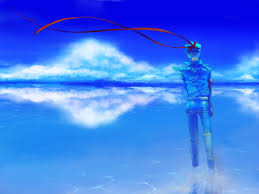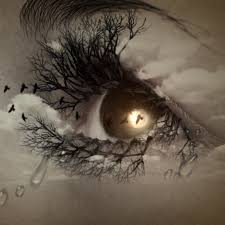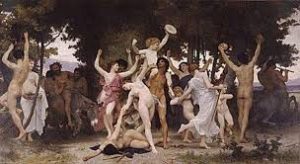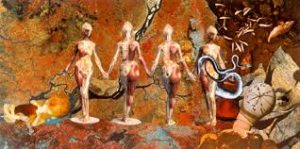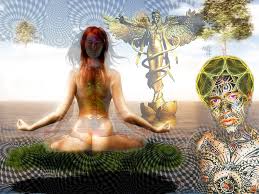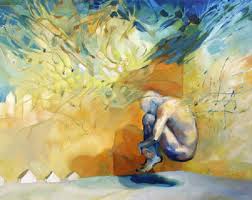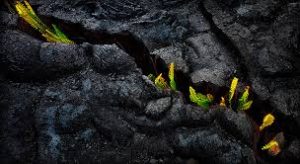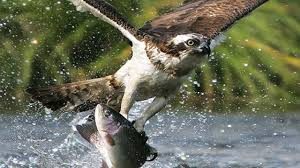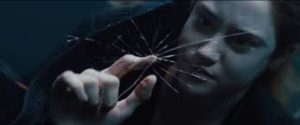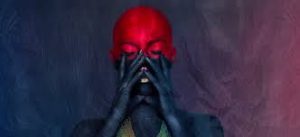Time overlays are versions of master events, in that they occur in such a fashion that one “face” of an overall event may appear in one time, one in another, and so forth.
Time overlays are the time versions of certain events, then. These time overlays always exist. They may become activated, however, by certain associations made in our present, and therefore draw into our present time some glimpses either from the future or the past. So-called present time is thickened, then, by a psychological realization on deep levels of the psyche that all events are interrelated, and that the reincarnational experiences of any given individual provide a rich source of experience from which each person at least unconsciously draws.
Such usually unconscious knowledge is of great benefit to the species itself, so that at certain levels, at least, the knowledge of the species is not imprisoned within any given generation at once, but flows or circulates within the overall larger reincarnational picture. Probabilities are very much involved here, of course, and it is easier for particular events to fall within one time sequence than another.
I do not want us to feel that we are fated to experience certain events, however, for that is not the case. There will be “offshoots” of the events of our own lives, however, that may appear as overlays in our other reincarnational existences. There are certain points where such events are closer to us than others, in which mental associations at any given time may put us in correspondence with other events of a similar nature in some future or past incarnation, however. It is truer to say that those similar events are instead time versions of one larger event. As a rule we experience only one time version of any given action. Certainly it is easy to see how a birthday or anniversary, or particular symbol or object, might serve as an associative connection, rousing within us memories of issues or actions that might have happened under similar circumstances in other times.
Actually, that kind of psychological behavior represent the backbone of social organization as far as the species is concerned, and it is the usually hidden but definite past and future memories of reincarnational relationships that cement social organizations, from small tribes to large governments.
To a certain extent, or course, we have been or will be each related to the other. In that light all of the events of time rub elbows together. We brush against the elbow of a future or past event every moment of our lives.
In the culture that we know, such information remains hidden from us. Our main belief systems lead us to feel that our present life is singular, unsupported by any knowledge of prior experience with existence, and fated to be cut off or dead-ended without a future. Instead, we always carry the inner knowledge of innumerable available futures. Our emotional life at certain levels is enriched by the unconscious realization that those who love us from past or future are connected to us by special ties that add to our emotional heritage and support.
As many have supposed, particularly in fiction, love relationships do indeed survive time, and they put us in a special correspondence. Even as we were aware of reincarnational existences, our present psychological behavior would not be threatened but retain its prominence — for only within certain space and time intersections can physical actions occur. The more or less general acceptance of the theory of reincarnation, however, would automatically alter our social systems, add to the richness of experience, and in particular insert a fresh feeling for the future, so that we did not feel our lives dead-ended.
In earlier blogs I mentioned several times that we must reach a point at which we are able to see around the corner of seemingly contradictory material, and this is one of those occasions. Time overlays present us with a picture in which we have free will — yet each event that we choose will have its own time version. Now those time versions may be entirely different one from the others, and while we certainly initiate our own time version, in terms of usual understanding there is no true place or time in which that version can be said to actually originate.
Such a time version suggests an occurrence in time, of course, and yet the event may leave only a ghostly track, so to speak, being hardly manifest, while in another life the time version may be of considerable prominence — while in our own experience it represents a fairly trivial incident of an ordinary afternoon.
The inner core of events, however, is held together by just that kind of activity. We are at every hand provided an unending source of probable events from past and future, from which to compose the events of our lives and society. Again, let me remind you that all time exists simultaneously.
In an experience last evening in the dream state, I received fresh evidence by viewing for myself portions of two other lives — merely snatches of environment, but so dearly filled with precious belongings and loved ones, so alive with immediacy — that I was shocked to realize that the full dimensions of existence could continue so completely in such detail and depth at the same time as my present life.
It seemed that I could step from any one such existence to the other as we might walk from one room to the other, and I knew that at other levels of the psyche this was indeed possible– and, of course, at other levels of the psyche those psychological doors are open.
I have had particular difficulty, however, with “the theory of reincarnation,” because as it is usually described, it seemed that people used it to blame as the source of current misfortune, or as an excuse for personal behavior whose nature they did not otherwise understand, and it has been so maligned. Its reality, however, serves to generate activity throughout time’s framework as we understand it, to unite the species, to reinforce structures of knowledge, to transmit information, and perhaps most of all to reinforce relationships involving love, brotherhood, and cooperation between generations of men and women that would otherwise be quite separate and apart from each other.
Through such relationships, for example, say, the cavemen and cavewomen and the people of the 22nd century rub elbows, where in strict terms of time the species would seem to be quite disconnected from its “earlier” or “later” counterparts.
Through such behavior the overall value fulfillment purposes and intents of the species are kept in focus, and those necessary requirements then planted in whatever space or time is required. Again, free will still operates in all such ventures.
Now while it seems that our world contains more and more information all the time, our particular brand of science is a relatively narrow one, in that it accepts as valid only certain specific areas of speculation. The areas outside of its boundaries become taboo, so that the realm of the unknown is no longer the material universe or the mysteries of space, but the interior universe and the mysteries of the mind as these are experienced or suspected to exist outside of those official areas. To that degree, the unknown is more feared by science than it ever was by religion.
Religion was hampered — and is — by its interpretation of good and evil, but it did not deny the existence of other versions of consciousness, or different kinds of psychological activity and life. Reincarnation suggests, or course, the extension of personal existence beyond one time period, independently of one bodily form, the translation or transmission of intelligence through non-physical frameworks, and implies psychological behavior, memory and desire as purposeful action without the substance of any physical mechanism — propositions that science at its present stage of development simply could not buy, and for which it could find no evidence, for its methods would automatically preclude the type of experience that such evidence would require.
People can become quite frightened, then, of any kind of experience of a personal nature that imply reincarnational life, for they are then faced with the taboos of science, or perhaps by the distorted explanations of some religions or cults. We therefore protect ourselves from many quite natural up thrusts that would on their own give us experience with our own reincarnational existences, and we are often denied psychological comfort in times of stress that we might otherwise receive.
I do not necessarily mean that full-blown pictures of other existences would necessarily come into our mind, but that in one way or another we would receive a support or change of mood as those loved by us in other lives in one way or another sensed our need and responded.
The entire nature of events, then, exists in a different way than we have supposed, only small portions slicing into the reality that we recognize — yet all underneath connected to a vast psychological activity. We might compare events to psychological consonants that underlay or underlie the more unusual features of physical psychological environment.













